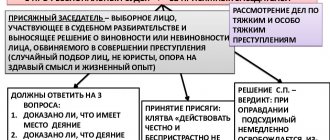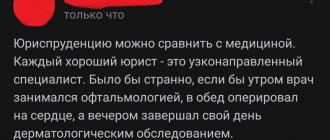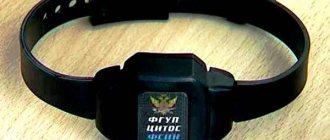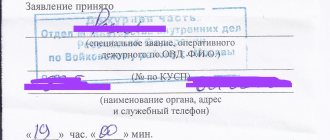Home / Situations
Back
Published: 10/15/2019
Reading time: 4 min
0
813
Imagine: you calmly walk into your entrance after a hard day at work, you are tired and hungry, but before you ride the elevator that will take you to the top of your apartment building, you need to check your email. And there, among a heap of advertising brochures and bills for an apartment, you suddenly discover a letter from the court or the city administration, and a vague feeling of anxiety pierces you. So what's in the envelope?
- How do they get elected to the jury, or “Why me?!”
- What responsibilities does participation in the process entail?
- Is the time spent paid?
- Is it possible to refuse participation?
How do they get elected to the jury, or “Why me?!”
And in the envelope is a summons informing you that you have been selected to serve on the jury, that this is your civic duty and other information. Having thoroughly studied the issue, I want to tell you about participating in court as a juror.
So how did it happen that you were chosen? The fact is that every four years the court or city administration draws up lists of candidates for the role of jurors. And, accordingly, if you received a letter, you were selected as a candidate.
There are a number of restrictions that do not allow persons to participate in the hearing as a jury:
- under 25 years old;
- having an outstanding or unexpunged criminal record;
- incompetent or partially capable;
- registered in a narcological or psychoneurological dispensary;
- under investigation;
- who do not speak the language in which the process is conducted;
- having psychological and physical pathologies that interfere with full participation in the process.
The rules for the formation and submission of jury lists are set out in more detail in Federal Law N113-FZ “On jurors of federal courts of general jurisdiction in the Russian Federation.”
Who are jurors and why are they needed?
Jurors are ordinary people, residents of Revda, who participate in the consideration of a criminal case along with the judge. Since they are non-specialists and are involved in the consideration of only one specific crime, they are not interested in the case, their decision depends only on the convincingness of the arguments of the parties in the process. In addition, the more people involved in making a decision, the more difficult it is to put pressure on them: that is, the opinion of a jury is more objective and independent than that of a single judge.
What responsibilities does participation in the process entail?
If you agree, you will be invited to court to form a panel, which occurs in several stages. Your consent and appearance in court does not mean that you will necessarily be elected to the panel, since during its formation the parties may challenge the juror.
If you do pass the selection, you will need to take an oath. The jury's task is to answer three questions posed by the court:
- Has it been proven that the act of which the defendant is accused took place?
- Has it been proven that the defendant committed the act?
- Is the defendant guilty of this crime?
If the defendants decide not guilty, then the judge will issue a verdict of not guilty; if the panel decides that the defendant is guilty, then the judge imposes a punishment based on the rules of the law and the circumstances of the case.
Consequently, the jury does not need to understand the laws, classify the crime in any way, or choose the type of punishment. This is the task of the competent law enforcement and judicial authorities.
Jurors are required to discuss the case only during the trial, and outside of the trial they are prohibited from seeking additional information about the case or discussing its details.
The rules of legal proceedings with the participation of a jury are disclosed in more detail in Chapter 42 of the Code of Criminal Procedure of the Russian Federation.
I'm on the list. But I don't fit
If a person does not meet all these requirements, but is on the jury list, he can (and should) apply to the administration to be removed from the list. However, if he does not apply himself, he will still be excluded during the inspection (they will not be punished for this).
But if it is revealed that one of the jurors who participated in the trial could not have been a juror, but hid it, the court’s decision will be canceled, and in this case the case will be subject to a new trial, with the participation of other jurors.
Is the time spent paid?
Participation is paid in the amount of one-half of the official salary of the judge of the court in which the case is being considered, but not less than the average income of the participant at his main place of work. Travel to the court location is also paid.
A juror takes part in the process once a year for 10 days, and if the process is not completed during this time, then the period of participation is extended until its end. The employer is obliged to release the employee for the time required to complete the trial, and during the performance of these duties has no right to dismiss or transfer the employee to another position.
Participation in litigation is also taken into account as work experience.
Is it possible to refuse
To refuse, you need to write a statement indicating the reasons, which may include:
- age over 65 years;
- health problems, long-term treatment and other medical reasons;
- the applicant is a notary, military man, civil servant, church minister, lawyer. Such people should not automatically be included in the lists of applicants, but errors are possible.
If a person has already been selected as a juror, he can recuse himself on the following grounds:
- age from 60 years;
- presence of a child under 3 years of age;
- work, the absence of which in connection with participation in court hearings harms public or state interests;
- according to religious beliefs.
The last ground is the most difficult to prove, so the chances of it being accepted by the court are the greatest.
Who selects jurors for the trial?
A separate panel of jurors is recruited for each trial. City courts serve six jurors, plus two alternates. In total, eight jurors must be selected for the trial in Revda. They are chosen in court from lists, still by random sampling. Each candidate is checked, summoned to court, and the possibility of his participation in the process is clarified. In addition to the above general conditions, a juror cannot be a close relative or relative of any of the participants in the proceedings in this criminal case. Also, a juror (candidate juror) cannot participate in criminal proceedings if there is reason to believe that he is personally, directly or indirectly interested in the outcome of this criminal case.
In addition, the prosecutor and the defendant may ask (even without reason) to disqualify one or more candidates from the preliminary list. And they should be expelled.
The jury selects a foreman and, before the hearing begins, takes an oath in which they solemnly swear to perform their duties “honestly and impartially.” If one of the jurors falls ill during the hearing of the case or for other valid reasons cannot attend the hearing, or is removed (at the initiative of the judge or at the request of the parties), then he is replaced by a reserve juror, who is also present at the court hearings.
Role in court
According to the laws of the Russian Federation, the status of jurors is mandatory for selected persons. And it is defined not only as the right to make judicial decisions, but also as the duty of a citizen of the country.
The status of a juror is equal to the status of the judge presiding over the courtroom. The difference lies in the manner in which the verdict is reached by the citizens' commission.
After the defense and prosecution have presented their arguments, the jury is given evidence that points to the defendant's guilt or innocence in the crime. At the end of the hearing, the panel of assessors is invited to a separate room where they answer questions about the hearing. Namely:
- about the proof or lack of proof of the unlawful act;
- about the guilt or innocence of the defendant, based on the evidence and evidence;
- about the proof or indirectness of evidence;
- to find the defendant guilty or not guilty.
Based on the jurors' answers, the judge makes a verdict. This limits the role of the jury in the hearing process. The judge makes decisions independently on current issues relating to the legal side.
Dirty methods
Members of organized criminal groups who remain at large are openly threatening the jury with violence. But high-ranking corrupt officials exert pressure, luring people to their side.
In Kazan, in 2021, they began to hear the next criminal case of the Gryaz organized crime group, which was part of the Sevastopolskiye criminal community. According to investigators, the leaders of the group, Ramil Abdrakhmanov and Artem Rusakov, killed their accomplice, a certain Morogov, in 2003.
The jury was selected on March 18, 2021, and on the same day the foreman, a doctor from one of the major republican medical institutions, was elected. During the trial, among the spectators were 58-year-old Sayavush Jafarov and 38-year-old Samir Aliyev, relatives of Abdrakhmanov. On April 12, after the completion of the judicial investigation, they came to the foreman of the jury at work, burst into her office and demanded that Abdrakhmanov be acquitted, threatening otherwise to kill both the woman herself and her close relatives, as well as burn down her apartment and house.
Both were detained a day later. They were sentenced to a fine of 110 thousand rubles each. The jury, who knew about the threats to the foreman, nevertheless returned a guilty verdict to the leaders of Gryaz.
There are no statistics on cases of verdicts being overturned due to pressure on jurors. But we must understand that any non-procedural influence on the jury is considered a criminal offense, which is characterized by high latency (concealment). If a person really perceives received threats, he usually does not report it
Galina KarpovaSenior Prosecutor of the Department of State Prosecutors of the Prosecutor General's Office of Russia
On April 30, 2021, the Moscow City Court announced a verdict against 36-year-old resident of the Moscow region Anton Bukreev for pressuring the jury. He was associated with members of the Pushkin criminal community, whose leaders were Dmitry Lesnyakov and Dmitry Zavyalov - they were tried for murder and banditry.
Anton Bukreev, convicted of attempting to bribe a jury
Photo: from the criminal case materials
Last summer, Bukreev noticed one of the jurors near the Tushinskaya metro station, whose face he remembered during the trial. He followed her to the Novogireevo metro station - and this is a completely different end of Moscow. There he approached the woman and offered a large sum to acquit the bandits. The stranger's proposal sounded more like a threat. The juror was not one of the shy ones and told the judge what had happened. Security at the college was strengthened, and Bukreev was detained. He was sentenced to one year in a general regime colony. Information about the progress of the trial of the leaders of the Pushkin organized crime group, which lasted almost three years, was kept as secret as possible. As a result, the gang leaders received life sentences, the remaining participants - from 12 to 23 years.
Requirements for candidates
The selection of persons who will administer justice as assessors occurs through random selection using a computer program, after which lists are formed by the highest executive body of power. This procedure is carried out once every four years. There are only two lists - a general one and a spare one.
A candidate for juror must have the following criteria:
- be over 25 years of age;
- have no criminal record, if it is removed or expunged, then the person has every right to become a jury;
- not be registered with a psychiatrist or narcologist;
- be a citizen of your state and speak Russian;
- have no physical disabilities;
- is not under investigation, in other words, he should not have the status of a suspect or accused of a crime.
If a person fits all the criteria for the role of a lay judge, then he must be confirmed as a juror.
Jury selection
The status of jurors requires certain rules in the selection of candidates. Executive and administrative bodies, based on voter data, conduct a random selection of candidates using the State Automated System “Elections”.
Based on the selection results, the lists are adjusted based on the requirements for the status of jurors. Persons who do not comply with Art. are excluded. 3 of the Federal Law, as well as in cases where a person files a statement about the impossibility of performing the role of a jury. The reason for refusal may be:
- the language barrier;
- health status;
- refusal is accepted from persons over 65 years of age;
- the position of a judge, investigator, lawyer, bailiff, detective working privately - if the person continues to carry out activities or the period after its termination is less than five years;
- military personnel and retired personnel, if five years have not passed since the date of dismissal;
- service in the ranks of the church;
- work in the authorities supervising the circulation of psychotropic drugs, in the customs service and internal affairs authorities, during the period of involvement in the execution of civil duty in court, and if five years have not passed since the date of dismissal from the place of service.
“Motya will deceive you”
At the beginning of 2021, a serious scandal broke out in Irkutsk related to the criminal case of the kidnapping of businessman Ruslan Dukin. In 2021, he was captured in the city center and taken to the mansion of local authoritative businessman Dmitry Matveev, a billionaire nicknamed Motya. The hostage was forced to abandon a shopping center worth more than 300 million rubles.
FSB officers, carrying out a set of operational investigative measures on the facts of smuggling of telephones into the pre-trial detention center, were able to record several conversations between the accused and their relatives.
A transcript of one such conversation is at the disposal of Lenta.ru. In it, the father of the defendant, who is at large, tells his son, who is sitting in a pre-trial detention center, that the organizer of the crime paid a lot of money to the jury for the “correct verdict.”
Dmitry Matveev
Photo: Investigative Committee of the Investigative Committee for the Irkutsk Region
As a result, it was possible to establish that one of the jurors, when selecting for the panel, hid the fact that two of the five accused - Dmitry Matveev and his son - were not only her neighbors, but also good friends. Then it turned out that, already as a jury, a woman in a neighboring region purchased an expensive foreign car for 2.7 million rubles in cash, and she could not explain the origin of the money.
The judge, having received the information, asked mobile operators for telephone data from this juror and saw that the woman was calling the defendants’ defense lawyer every day and had lengthy conversations with him. In addition, she brought materials into the deliberation room that were not examined in court, introduced them to other members of the board, and actively campaigned for the acquittal of all the defendants.
As a result, on January 18, 2021, the juror was removed from the panel, and the next day, January 19, the entire panel was dissolved, starting the process all over again.
At the same time, FSB officers intercepted another conversation between the accused from the pre-trial detention center and his relative in the wild. In the conversation, the prisoner admits that the organizer of the kidnapping offers him to take all the blame for a large sum, but the interlocutor dissuades him.
Motya will deceive you, he has no faith, he has already promised money to many people and has not given it to anyone
relative of an accused kidnapper






